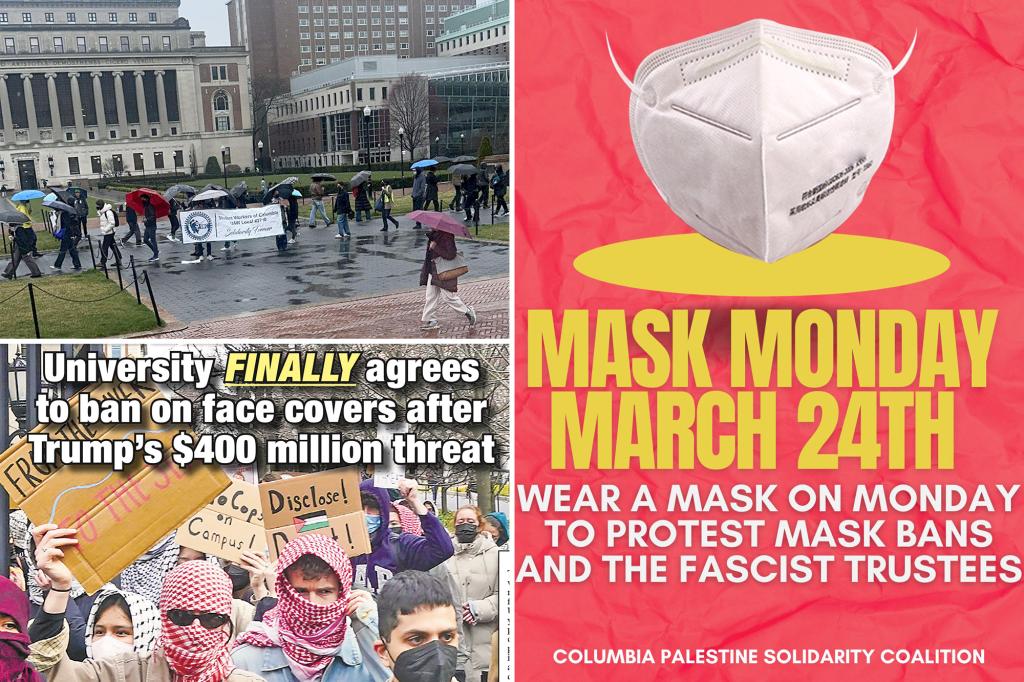Dozens of masked protesters swarmed Columbia University’s campus less than 72 hours after school officials enacted restrictions curbing face coverings to comply with a Trump administration order aimed at combatting antisemitism in higher ed.
The fresh round of demonstrations led a Jewish Columbia student to question whether the new rules went far enough.
“They’re protesting the mask ban. They’re defying what they perceive is a mask ban. There is no mask ban,” Eden Yadegar, 21, a senior Middle East studies major told The Post.
“It’s frightening to see what has happened over the last 18 months. I’m concerned about the future of higher education. It’s really disturbing what has been happening, the desecration of our community,” she said.
The protesters, organized by the Graduate Student Union and the Palestine Solidarity Coalition, put out a cattle call on social media Monday, proclaiming it “Mask-Up Monday” — provocatively thumbing their noses at the university’s newly announced restrictions and urging students, faculty and staff to skip work or class for the day.
“Columbia, in collaboration with the White House, is attempting to repress its students fighting for Palestinian liberation just as ‘Israel’ has broken the ceasefire and re-escalated its genocide of Palestine,” a flyer making the rounds online read in part.
The Trump administration called for a total ban on masks at campus protests as part of a sweeping list of university reforms in a March 3 letter penned by a joint task force composed of the Department of Education, the General Services Administration and Health and Human Services.
The Ivy League school was given a month to comply or risk losing around $400 million in federal funding.
On Friday, Columbia announced it would cooperate with the order, instituting numerous policy changes in direct accordance with the task force’s demands. Among the changes, the university banned all face coverings on campus worn “for the purpose of concealing one’s identity in the commission of violations of university policies or state, municipal or federal laws.”
The university also said it would now require anyone on campus wearing a mask to promptly identify themselves when asked by a public safety officer, or be subject to “discipline, being escorted off campus and detention for trespass where appropriate.”
Yadegar, a former member of Students Supporting Israel, said she’s “cautiously optimistic” that the reforms will improve conditions on campus — as long as the school actually enforces them.
“Every time I get my hopes up, we take three steps backward,” she said.
The Morningside Heights campus has become a hotbed of antisemitic sloganeering and demonstrations since Israel declared war on Hamas following the Oct. 7, 2023 terror attacks, including most infamously a violent takeover of Hamilton Hall last spring where rioters draped a giant banner calling for “intifada.”
In a statement to The Post, the university reiterated its new policies regarding masks on campus — pledging “any violations will be met with consequences” — while reaffirming its commitment to adhering to the terms of the budding agreement with the Trump administration.
“Columbia is fully committed to the steps we announced last week to continue to combat antisemitism and all forms of discrimination and harassment,” the statement read.
The Trump administration joint task force issued a statement ahead of Monday’s protests saying it was “encouraged” by the University’s initial steps.
“Columbia is demonstrating appropriate cooperation with the Trump Administration’s requirements, and we look forward to a lasting resolution,” said Secretary of Education Linda McMahon.
“I have been in communication with Columbia University Interim President Katrina Armstrong over the last few weeks and appreciate her leadership and commitment to advance truly meaningful reforms on campus.”
Read the full article here


